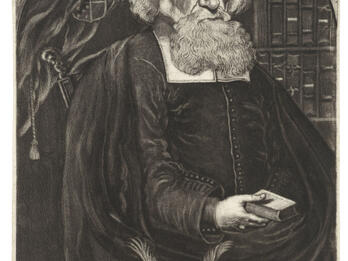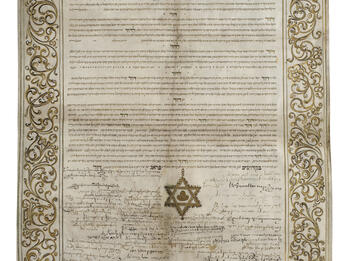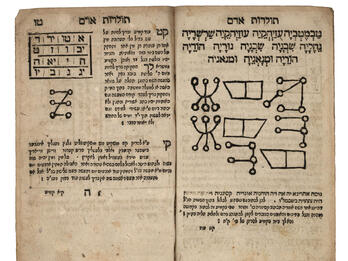Nishmat Shabbetai ha-Levi (The Breath of Shabbetai ha-Levi)
Everything proceeds from above, from the world of emanation, excepting no point in the lower world. And even a tree, and a stone, and everything comes from above; and this is the procession of emanation. If it is so, then what is the advantage for the righteous man in all of his toil [see Ecclesiastes 1:3], when we say to him that his soul is from the world of emanation? After all, everything comes from the world of emanation, through the procession of emanation. And he too—that is, the righteous man—also comes in the procession of emanation. And behold, I shall answer you and I shall enlighten the eyes of your intellect concerning this matter too. [ . . . ]
When a man has just been born, he only has a vital animal soul [nefesh] from the angelic ofanim who are from the side of purity, as they are the beginning of the world of action [‘asiyah]. He has no spirit or intellective soul, but if he should gain merit through the Torah and the commandments by way of good deeds, then he shall merit a spirit of formation [ruaḥ of yetsirah] from the world of formation. And if he should gain further merit through the Torah and through good deeds, then he shall merit an intellective soul of creation [neshamah of beriyah]. And if he should gain further merit, then he shall merit a vital soul from [the sefirah of] malkhut [“kingdom”; the tenth sefirah], which is called “the daughter of the King.” And if he should gain further merit, then he shall merit a spirit [ruaḥ] from [the sefirah of] tif’eret [“beauty”; the seventh sefirah], which is called “the son of the King.” If he should merit further, then he shall merit an intellective soul [neshamah] from [the sefirot of] ḥokhmah [“wisdom”; the second sefirah] and binah [“understanding”; the third sefirah]. Behold, it is explained that there are souls that have their origins in the place of the ofanim, and there are souls that have their origins in the world of yetsirah [“formation”], and souls that have their origins in the world of beriyah [“creation”], which is the throne of glory. And there are souls that have their origins in the holy malkhut, and souls that have their origins in tif’eret, and souls that have their origins in ḥokhmah and binah. And behold, after you have known this, you should know a soul [neshamah] whose origin is in the place of the ofanim and has not increased its light through merits is like a rope that is tied on one end to the ofanim and on the other end to his body. During its lifetime, this soul’s prayers and deeds will not rise above the ofanim for the rope of its soul does not rise above the ofanim. The metaphor here is of a rope that is tied on one end, and the other end is in your hand. When you swing the rope, you cannot swing it further than its full length. You cannot swing it above and beyond the rope, for your power has already expired through the rope and will not rise above it. In the same way, at the time of such a person’s bodily death, his soul will not rise above the ofanim, for the ofanim are his source, that is to say, the source of his soul. Thus it is with one whose soul is from the world of yetsirah and he has not further increased his light through merits. He is like a rope that is tied on one end to yetsirah and to his body at the other end; behold, this type of person, too, will not rise above the world of yetsirah, which is his source, through his actions and prayers, and this is also a low level.
However, a soul whose origin is in the world of beriyah, which is the clothing of the King, the clothing of holidays and Shabbat, clothing of happiness and joy [ . . . ] such a soul that is tied to the clothing of the King in the world of beriyah is indeed like a rope that is tied on one end above, to the clothing of happiness and joy, and on the other end to the body of the righteous man below. In this way, when he swings his rope, he swings it up until the world of beriyah, which is the clothing of holidays and joy. He thereby cancels out all the difficult decrees and the stern judgments that were decreed and pronounced from the world of yetsirah, for there in the world of yetsirah are the heavenly courts and the seats of judgment whose eyes watch over all of the ways of men, in order to give to each man according to his ways and according to the fruits of his iniquities [see Jeremiah 32:19]. There are heard the decrees and arguments and cries of judgment, and disputations and other such matters, and in the world of ‘asiyah are the officials who enforce the judgments that were pronounced in the courts in the world of yetsirah. [ . . . ] However, in the world of beriyah are heard neither decrees nor cries of judgment, but in place of them only happiness, joy, and delight. Thus, one who merits a soul of beriyah rises through his prayer and good deeds, by way of his rope, above the world of yetsirah, and arouses the overflow of the world of beriyah upon the world of yetsirah, from the clothing of the King, which is gladness and joy. And in such a way, he cancels out the powers of stern judgment and the officials of these powers.
Translated by
.
Credits
Shabbetai Sheftel (ben Akiva) Horowitz, Nishmat Shabbetai ha-Levi (The Breath of Shabbetai ha-Levi) (Prague: Moshe Kats, 1616; republished, Krakow: T. D. Lindenboym, 1898), pp. 23–25.
Published in: The Posen Library of Jewish Culture and Civilization, vol. 5.





